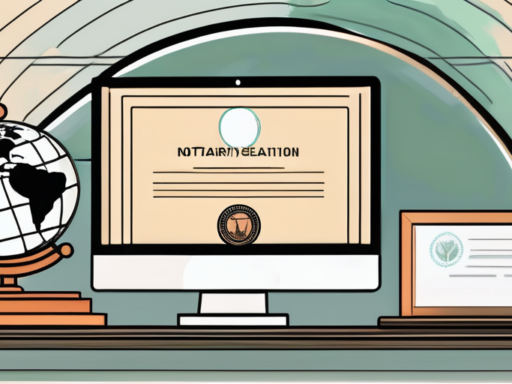Welcome to our practical guide to Remote Online Notarization (RON). In this article, our main focus will be RON’s world, its benefits, the differences between RON, RIN, and IPEN, and the best RON platform, BlueNotary. Let us not waste any time but dive right into it!
Understanding Remote Online Notarization (RON)
Deployment of Remote Online Notarization, popularly known as RON, is one of the breakthroughs of technology that makes it possible to notarize documents online. Whenever the RON is in use, the notary and the signers can be in different places, and even so, they can complete the notarization process by electronic means. Say goodbye to the traditional way of presenting yourself physically before the notary; RON brings about comfort and gives you the flexibility that makes it a perfect fit for remote transactions.
The notary electronically signs and seals the document during the notarization process, and adds a digital certificate that is a confirmation of the authenticity and the integrity of the document. With the digital certificate in place comes a timestamp, an indisputable record of the notarization date and time.
RON has a significant advantage among many others, such as the ability to complete the signing process without any physical involvement. With this, signatories are empowered to sign their documents from where they are and at their convenience. This is a time-saving and environmentally friendly option because travel becomes unnecessary. On top of everything, RON is more hospitable compared to traditional notarizing methods. Thus, it is a great alternative for those residing in far-flung locations or having limited mobility.

Exploring the World of RON: Helpful Resources
Before we get into the advanced level of RON, I would like to remind you of a few important resources that will make you aware of the technology change in the game and will be useful to you. You can access plenty of materials through the industry report, case study, blog, and podcast ,which will be helpful in your journey to be familiar with the RON.
Industry reports enlighten people on the new markets, products, and services monitored mainly by RON within various fields of business nature. The sectors these pivotal documents cover range from the economy itself, through the regulatory aspects, to the innovative potential that RON might still have. Only by having extensive knowledge on these reports can you become fully conversant with what RON may hold in store and be able to predict its future.
Case studies not only bring the academic examples but they also cover the reality of the companies that have already become supporters of electronic notarization. These examples clear out all the doubts of the company’s personnel and also show other similar emerging businesses the direction to aim for. Quite distinct from the latter, these studies give the solution to the problem and the then-evident opportunities.
If the article is the source you’re attracted to please try to find some that are interesting as well as informative. Here, you may uncover the thoughts and interpretations of various authors who are practicing in the RON field. They can provide you with a basic understanding of the technology, its regulations, and its ethical implications and thus you can decide on the best practices. In the podcasts, you will find real-life stories and experiences of those who serve in the RON industry. Also, you get to hear them sharing insights into the consumer perspective and you can build on their thoughts to determine the most effective ways for your task.
No matter if you are a person who has a public notary title, a lawyer, or an individual who just wants to get a glimpse of the RON universe these franchises are just the right ones and you will definitely be ready with the necessary expertise and acquaintance necessary to negotiate this constantly changing theme after you have read these available publications.
Which States Allow Remote Online Notarization in 2023?
It is really important to know about the laws of the states with regard to RON that are being implemented so that RON can be used in a correct and proper way. The adoption of RON is increasing the most at the same time that RON continues to meet resistance in some American states. Even so, more and more states are allowing RON. Here, you will be informed about those states that are practicing RON at the moment and the regulations regarding remote notarizations in the corresponding state.

Stay Updated: RON Regulations by State
Since RON regulations differ from one state to another, it’s essential to keep yourself informed about the recent changes. Every state has its own specific regulations and guidelines that every notary must follow. If you’re a notary looking to grow your business or a client engaging in a remote transaction, understanding and adhering to the regulations can make the whole difference. Being up to date with the latest changes and well-informed are the key points for an uninterrupted RON experience.
Here’s a simple illustration of the 4 states that accept remote online notarization at the moment.
1. California: California has been one of the leading states in remote online notarization. E-notaries in California have the right to do remote online notarizations if they meet the local conditions. They can do this exactly by passing a training program and applying for a digital certificate.
2. Texas: Texas State has also legally allowed e-notarization for quite a long time. Notaries in Texas are enabled to perform notarizations that are online and remote via audio-visual technology. They also need to pass a training course through the internet and obtain a remote online notary commission.
3. Florida: Florida is famous for its open-mindedness towards RON. A notary in Florida can carry out remote online notarizations for clients at any place in the world. The state has taken serious measures to ensure the safety of remote notarization through a secure system.
4. Virginia: Virginia has its own guidelines for allowing remote online notarization. The notaries there, for example, have to undergo a training course and then they will have the right to apply for a remote notary commission. Besides this, the notaries are only allowed to use the certified platforms to perform remote online notarization.
5. Ohio: Ohio is a state that has implemented remote online notarization. Notaries in Ohio can perform notarial acts using distant audio-visual technology. It is their duty to complete a training course and then to receive a remote notary commission.
The examples provided, however, are only a few of the states in the US that have adopted the concept of remote online notarization. Users need to be aware that these standards and rules may change in different parts of the country. To be on the safe side, you should check with your local authorities about the current regulations.
The technology is also likely to give a change for you to become the notary of your state. Practicing the regular checking of the latest rules will contribute a lot to both the notaries and the clients in the remote notarization corridors.
Unveiling the Benefits of Remote Online Notarization
Now that you have a better understanding of what RON is and its regulatory landscape, let’s explore the numerous benefits it offers. RON is revolutionizing the notarization process in countless ways and transforming the way businesses and individuals transact.
The Advantages of Remote Online Notarization
1. Do Transactions Conveniently Near Home or Office: RON makes geographical boundaries a thing of the past, allowing you to easily and securely notarize transactions while lying on the beach or sitting at home.
2. RON Allows Business Owners to have the Final Say in Their Business. RON notaries and business owners who opt for RON have the upper hand in the business world by choosing a super-convenient and highly efficient way to continue their business without any hassles and have the transactions completed in the shortest time possible. RON gives you the opportunity to find new clients and have the deals done faster, which leads to higher levels of customer satisfaction and thus the improvement in business growth.
3. RON – The Ultimate Solution to Eliminating Errors After Closing: RON is effectively the final solution to solve the problem of post-closing mistakes and ensures a significant decline in their occurrences. The electronic data processing used in RON makes it easy for the indicating, signing, and notarizing of documents to be the last steps, leaving no room for errors or potential legal disputes that can occur from the inaccurate or incompletely executed documents.
4. Make the Closing a Positive Interaction Experience for All: RON is the way to go for a smooth and customer-friendly closing experience for all participants in a transaction. Using the RON solution, the signatories can access the documents, and you can sign them remotely, which will remove the need for long hours of face-to-face meetings. The process also saves time and eases the closing for all involved.
5. Make ID Verification Process Unbreakable on the Closing Day: The process of identity verification is indispensable in notarizing the document. RON has a good range of identity verification methods, like multi-factor authentication and credential analysis, to make sure that the person signing is the actual person. By intensifying these protocols, RON provides the parties with a high level of security and confidence.
6. Humanize Your Business: RON adoption helps notaries save time by getting rid of the paperwork they no longer need, and getting involved in personal contact with clients. This change helps notaries build stable relationships with clients, provide excellent customer service, and give clients personalized advice which at the final stage is the lifeblood to their business – i.e. the human factor here.
Discover More: Valuable Resources on RON
If you’re eager to learn more about RON, we recommend exploring additional resources that will further expand your knowledge on this cutting-edge technology. From webinars hosted by industry experts to online forums where professionals share insights and experiences, there’s a wealth of information out there waiting for you!
Decoding the Differences: RON, RIN, and IPEN
While RON is undoubtedly at the forefront of digital notarization, it’s important to understand the differences between RON, Remote Ink Notarization (RIN), and In-Person Electronic Notarization (IPEN). Each method brings unique advantages and compliance requirements, making it crucial to know which one best suits your needs.
Understanding In-Person Electronic Notarization (IPEN)
IPEN is a hybrid notarization method that combines the convenience of digital tools with the traditional aspect of an in-person appearance before a notary. With IPEN, signatories electronically sign documents in the physical presence of a notary, combining the benefits of digital solutions with the comfort of a face-to-face meeting.
Unraveling the World of Remote Online Notarization (RON)
RON, on the other hand, is a fully digital process that allows notarizations to be conducted remotely, without the need for in-person appearances. With RON, the notary and signatories can complete the notarization process securely using audio-video technology and digital signatures.
The Best RON Platform: BlueNotary
If you’re ready to embrace the world of RON and experience its many advantages, we highly recommend choosing a reliable and user-friendly RON platform like BlueNotary. BlueNotary offers a comprehensive suite of features, including secure document storage, robust identity verification, and seamless integration with other platforms. With BlueNotary, you can trust that your RON transactions will be conducted securely and efficiently.
In conclusion, Remote Online Notarization (RON) is transforming the way notarizations are conducted, offering convenience, efficiency, and enhanced security. By staying informed about the latest regulations, leveraging the benefits of RON, and utilizing platforms like BlueNotary, you can take full advantage of this innovative technology and elevate your notarization experience. So, what are you waiting for? Embrace RON today and unlock a world of possibilities!








